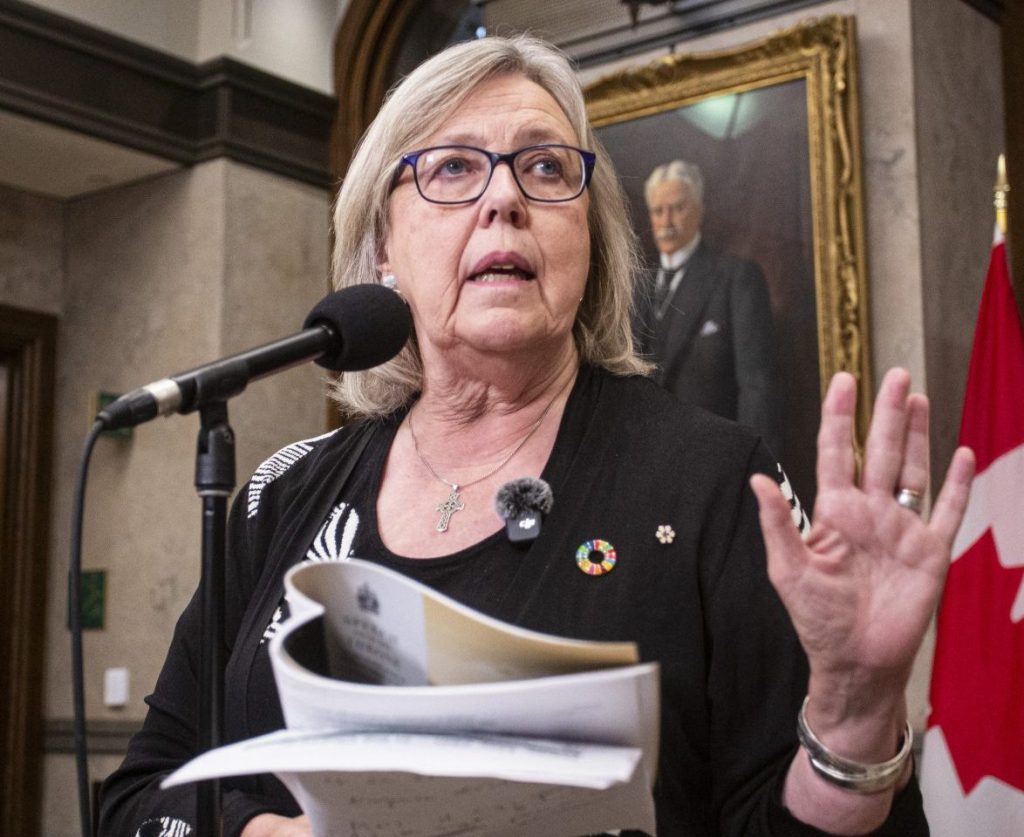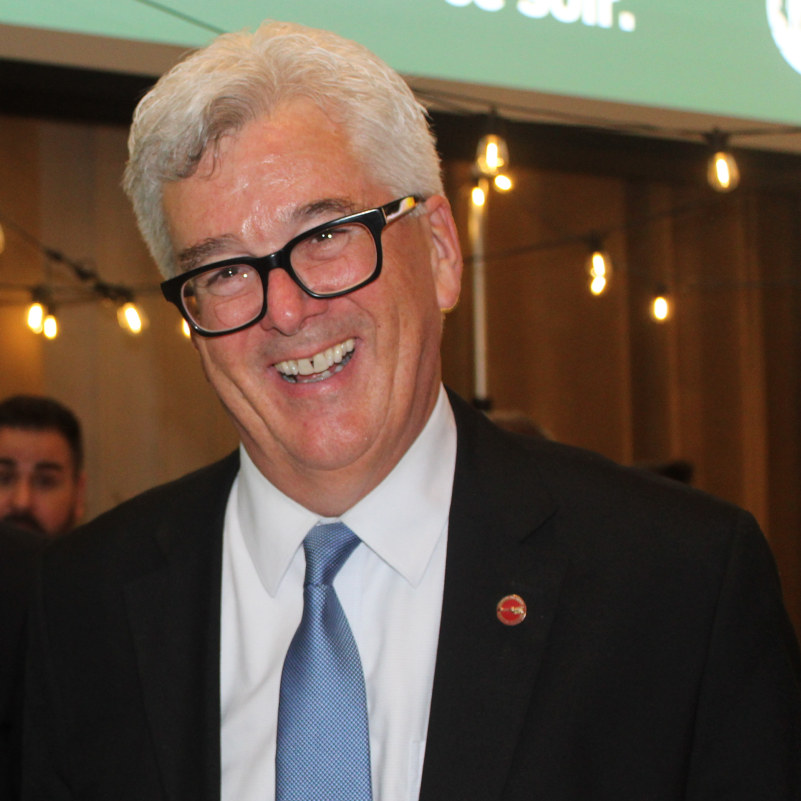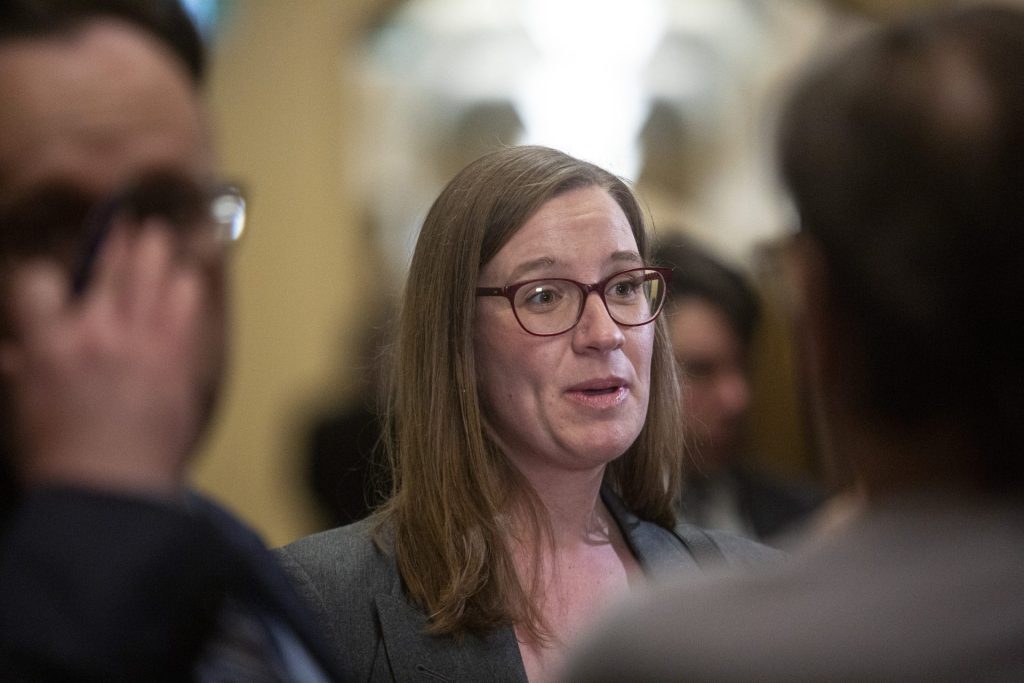Piggybacking changes to privacy laws ‘has nothing to do with affordability,’ say critics of Bill C-4

As the Liberals move to expedite omnibus bills through Parliament before the summer recess, Green Party Leader Elizabeth May says the urgency to provide affordability and tax relief to Canadians is no excuse to disrespect opposition parties and the Senate’s ability to study the wide-ranging and—in some cases—incongruous contents.
On June 5, the government introduced legislation to tackle Canadians’ affordability troubles and lower taxes: Bill C-4, the Making Life More Affordable for Canadians Act.
During his introduction of the legislation, Finance Minister François-Philippe Champagne (Saint-Maurice–Champlain, Que.) highlighted the income tax reduction measures and the elimination of the federal fuel charge as well as the GST for new homes under $1-million.
However, he neglected any mention of the bill’s fourth section, which proposes amendments to the Canada Elections Act immunizing federal political parties from compliance “with an Act of a province or territory that regulates activities in relation to personal information” unless those parties create a personal information policy that dictates otherwise.
The legislation would only require federal parties to adhere to the policies they create themselves. The parties must state the types of personal information they collect, and have a designated privacy officer to oversee compliance with the policy, which they have been required to do since 2018, following the enactment of Bill C-76, the Elections Modernization Act.
The proposed amendments are the Liberals’ third attempt to modify the Elections Act with similar changes. They follow similar language in the 44th Parliament’s Bill C-65, which specifically proposed amendments to the Canada Elections Act but died on the Order Paper at second reading, and in the 39th Division of Bill C-47, the 2023 Budget Implementation Act.

However, critics were quick to accuse the government of attempting to use the legislation to circumvent a long-standing legal battle in British Columbia, where last year, the province’s Supreme Court ruled the federal Liberals, Conservatives, and New Democratic Party must comply with provincial privacy laws and are subject to investigation by their privacy commissioners.
Green Leader May (Saanich–Gulf Islands, B.C.), one of the few MPs to question the government on the privacy provisions during second-reading debate on June 11, told The Hill Times that the Liberals’ preference for large omnibus bills—which she said are appropriate in some cases when all of the proposed sections of a piece of legislation serve a “central purpose”—is completely inappropriate in C-4 since “privacy has nothing to do with affordability.”
“These changes are designed to get political parties off the hook, and take Canada backwards on privacy protection,” May said, noting that, if passed, the changes would come into force retroactively, dating back to May 31, 2000, which would precede some sections of the Personal Information Protection and Electronic Documents Act passed in 2000.

While C-4 is “the most glaring example” of the inclusion of an unrelated section in the omnibus bills the Liberals are currently attempting to pass before the House rises for the summer, May said there seems to be one “through line” connecting them all: “Carney’s in a hurry.”
Champagne was also in a hurry after the June 10 cabinet meeting, and declined to stop to answer questions about the appropriateness of Part 4, given the legislation’s stated focus on affordability and the appeals process in the B.C. courts. That process was scheduled to begin June 24 but will likely be rescheduled until the fall.
In an emailed statement to The Hill Times, the office of Government House Leader Steve MacKinnon (Gatineau, Que.) wrote that the proposed amendments to the Elections Act would ensure a uniform federal standard for the management of personal information, and that the collection and use of personal information is “crucial” to the voter outreach and engagement that are “vital and essential to a healthy, modern democracy.”
While MacKinnon’s office did not directly answer questions regarding how that relates to affordability or the appropriateness of the changes given the court ruling, the statement noted that the changes were the same as those proposed in the 2024 elections reform bill, and that “the plan to protect the privacy of Canadians continues to be just as important now as when C-65 was introduced a year ago.”
May said despite the changes being previously included in an earlier bill, the Liberals’ current approach demonstrates a “disrespect to the parliamentary function of reviewing legislation,” noting the acceleration motion regarding Bill C-5 tabled in the House on June 12 would only give the House Transport, Infrastructure and Communities committee until 11:59 p.m. on June 18 to complete its study of the bill. The committee’s first meeting on June 16 was reserved to appoint the committee’s chair and vice-chairs.
Bill C-4 is currently awaiting its study at the House Finance Committee, which elected its chair, Liberal MP Karina Gould (Burlington, Ont.), and vice-chairs, Conservative MP Jasraj Singh Hallan (Calgary East, Alta.) and Bloc Québécois MP Jean-Denis Garon (Mirabel, Que.), at its first meeting on June 16. As of the publishing deadline, no meeting had been scheduled to begin the bill’s study.
Furthermore, while May said she has no doubt the Finance Committee would be more than equipped to study C-4’s contents related to the excise or income tax changes, it is not the appropriate venue to study privacy laws and how the parties should or should not be required to abide by them.

The bill won’t get a deep dive in the Senate as the Upper Chamber agreed on June 12 to a protracted pre-study of C-4.
CSG Senator Colin Deacon (Nova Scotia) told The Hill Times that since the Senate, sitting as Committee of the Whole, had already agreed to hear from Champagne as the only witness on June 16, he expects the legislation will pass through the Red Chamber on the merits of the tax relief measures alone.
Deacon said that while the majority of C-4 had come as no surprise—building on the Liberals’ campaign promises on affordability and tax reduction—Part 4 is decidedly unlike the others, though not completely unfamiliar.
Deacon noted that the language mirrors that of 2023 budget implementation bill, which also proposed an amendment to the Elections Act “to provide for a national, uniform, exclusive and complete regime applicable to registered parties and eligible parties respecting their collection, use, disclosure, retention and disposal of personal information.”
However, Deacon said neither was a legitimate attempt to do so, and instead have been attempts to block the application of B.C.’s provincial privacy laws, and undo the recent court decision mandating the federal parties’ compliance with them.

“It’s concerning that all three major federal political parties are good with citizen privacy rights remaining a promise, versus a reality,” Deacon said, noting that he viewed the lack of more serious debate and criticism from the Conservatives and NDP as an indication of their passive support for it.
“Unfortunately, Canada is desperately behind in terms of privacy, data rights, and cybersecurity for consumers and citizens,” Deacon said. “In this transformative era of AI, with quantum sitting on our doorstep, data rights are at the core of our individual and collective sovereignty. They are foundational and crucial to building and maintaining social licence.”
Andrew Clement, a computer scientist and professor at the University of Toronto’s Faculty of Information and one of three complainants in the B.C. court case, told The Hill Times that while he understands the Liberals’ urgency on the rest of the legislation, there is no evidence for the need to expedite changes to the Elections Act—especially less than two months after the last election.
Given the third attempt to make these changes and the parties’ long and expensive legal case in B.C., Clement said he is left with the impression they have “something to hide.” This feeling is only reinforced by the inclusion of the proposed changes at the end of an affordability bill, he said.
“The affordability premise is a no-brainer politically, but what’s the hurry to give political parties the ability to collect these vast amounts of information just to target their advertising?” Clement questioned. “This is unfortunate to say the least, and it belies Carney’s claim that he wants to govern in a new way when they’re just doubling down on the same game.”
In a statement to The Hill Times, the Office of the Privacy Commissioner of Canada wrote that it is currently analyzing the bill and would share its observations, “including any potential impact its provisions may have on Canadians’ fundamental right to privacy, with parliamentarians at the appropriate time.”
During his appearance before the Senate Legal and Constitutional Affairs Committee’s study of the budget bill in May 2023, Privacy Commissioner Philippe Dufresne said, “Canadians need and deserve a privacy regime for political parties that goes further than self-regulation and that provides meaningful standards and independent oversight to protect and promote electors’ fundamental right to privacy.”
The Hill Times






 LICENSING
LICENSING PODCAST
PODCAST ALERTS
ALERTS













